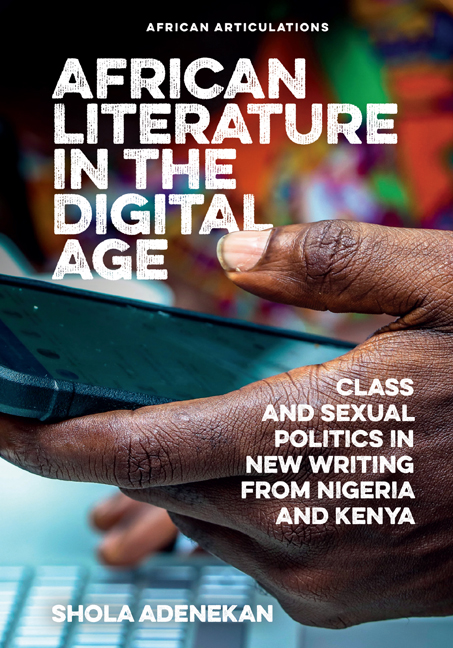 African Literature in the Digital Age
African Literature in the Digital Age Book contents
- Frontmatter
- Dedication
- Contents
- List of Illustrations
- Acknowledgements
- List of Abbreviations
- Introduction: Kenyan and Nigerian Writers in the Digital Age
- 1 Network Thinking: Literary Networks in the Digital Age
- 2 Class and Poetry in the Digital Age
- 3 Class Consciousness in Online Fictions
- 4 Digital Queer: The Queering of African Literature
- 5 Middle-Class, Transnational, Queer, and African
- 6 ‘Ashewo no be job’: The Figure of the Modern Girl in the Digital Age
- 7 The Erotic in New Writing from Nigeria
- 8 Social Media and the Aesthetics of the Quotidian
- Conclusion: Connecting the Dots
- Bibliography
- Index
- Miscellaneous Endmatter
4 - Digital Queer: The Queering of African Literature
- Frontmatter
- Dedication
- Contents
- List of Illustrations
- Acknowledgements
- List of Abbreviations
- Introduction: Kenyan and Nigerian Writers in the Digital Age
- 1 Network Thinking: Literary Networks in the Digital Age
- 2 Class and Poetry in the Digital Age
- 3 Class Consciousness in Online Fictions
- 4 Digital Queer: The Queering of African Literature
- 5 Middle-Class, Transnational, Queer, and African
- 6 ‘Ashewo no be job’: The Figure of the Modern Girl in the Digital Age
- 7 The Erotic in New Writing from Nigeria
- 8 Social Media and the Aesthetics of the Quotidian
- Conclusion: Connecting the Dots
- Bibliography
- Index
- Miscellaneous Endmatter
Summary
In the previous chapters, I showed the ways in which class intersects with every facet of the digital network, but in the next four chapters, I am going to analyse this intersection with sexual politics. In this particular chapter, I use the digital writings of mainly Nigerian and Kenyan queer writers to highlight the notion of the queering of African literature. I will compare their aesthetic strategies with that of the first generation of post-independent African writers, with a focus on Wole Soyinka's The Interpreters and Ama Ata Aidoo's Our Sister Killjoy. I am foregrounding this comparison on the important argument put forward by the Kenyan queer scholar and blogger Keguro Macharia that ‘digital Africa cannot be imagined or theorised without placing digital queer Africa, at its heart’ (2017, 1). Using Black Looks (Blacklooks.org), the queer blog and network set up by the British-Nigerian queer activist Sokari Ekine as his case study, Macharia in ‘Digital Queer Africa’, his presentation at a workshop I co-organised at Amherst College, USA, in October 2017, surmises that instead of deploying mainly European/Caucasian theorists to understand queer Africa in the digital age, we need to think with queer Africans. This is because digital Africa generates its own theory as bloggers like Ekine ‘mapped and created connections across geographies and histories’ (1).
Macharia's observation is apt because if we want to articulate the way in which digital African writing challenges and undermines conventional thinking about history, affect, memory and sexual politics, queer Africans are at the forefront of such movements. There are some key points that I want to emphasise in this chapter that Queer Kenya and Queer Nigeria cannot be theorised without approaching them from a continent-wide perspective because queer African writers do not limit their portrayal to a national boundary. In fact, their texts reject all remnants of the project of colonial modernity, of which the twenty-first century's nation-state is a good example.
- Type
- Chapter
- Information
- African Literature in the Digital AgeClass and Sexual Politics in New Writing from Nigeria and Kenya, pp. 75 - 96Publisher: Boydell & BrewerPrint publication year: 2021
